译林版(2020) 必修第三册 Unit 1 Nature in the Balance 单元复习课件(98张)
文档属性
| 名称 | 译林版(2020) 必修第三册 Unit 1 Nature in the Balance 单元复习课件(98张) | 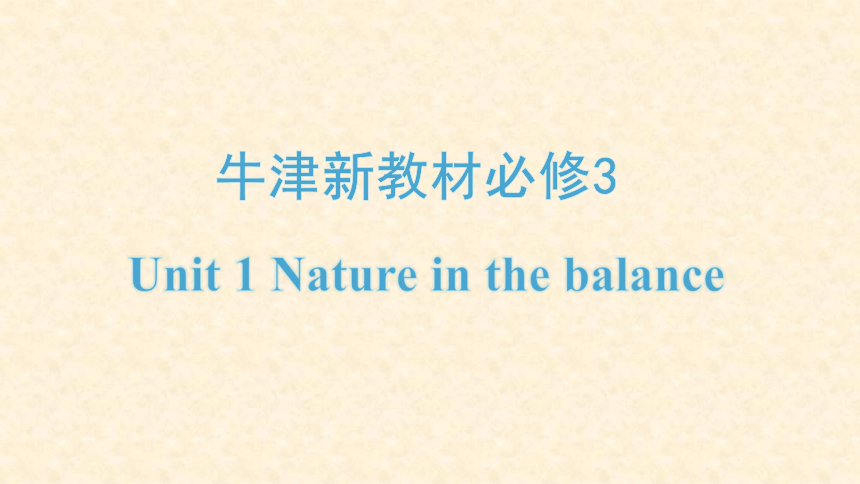 | |
| 格式 | pptx | ||
| 文件大小 | 1.3MB | ||
| 资源类型 | 教案 | ||
| 版本资源 | 牛津译林版(2019) | ||
| 科目 | 英语 | ||
| 更新时间 | 2022-09-13 10:02:24 | ||
图片预览

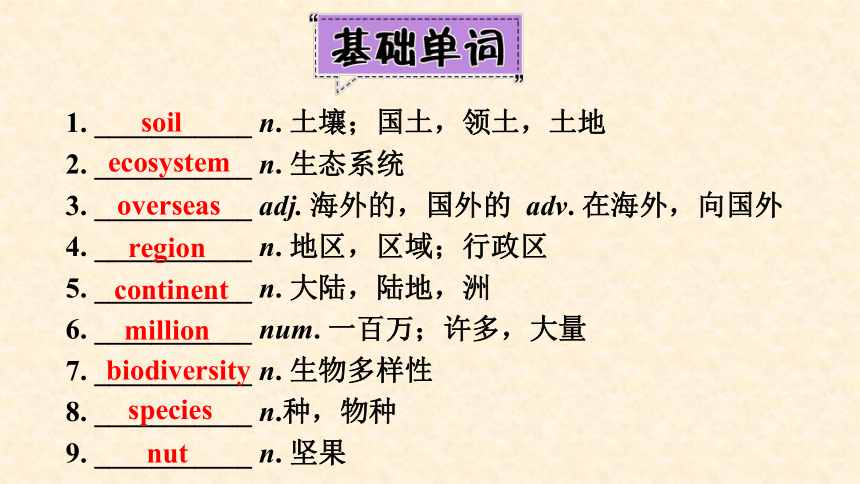
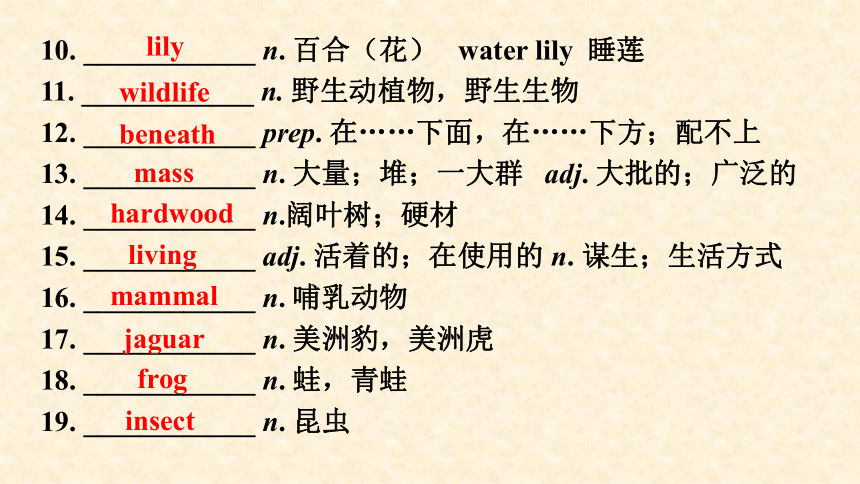
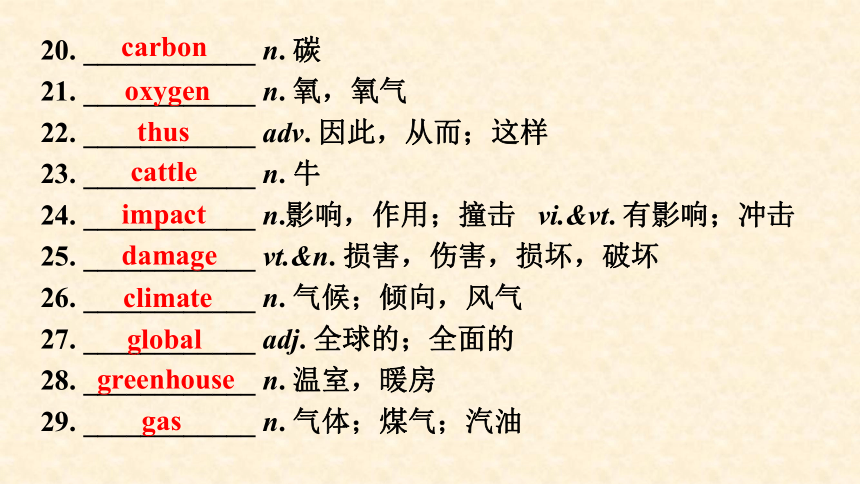
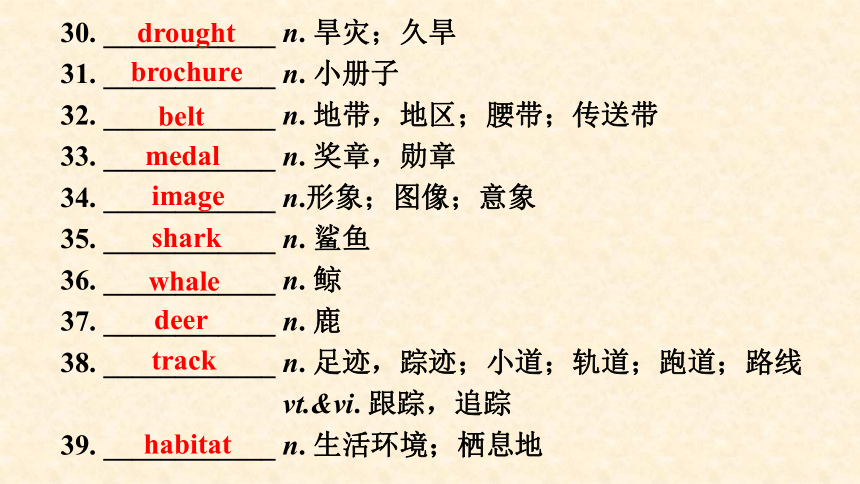
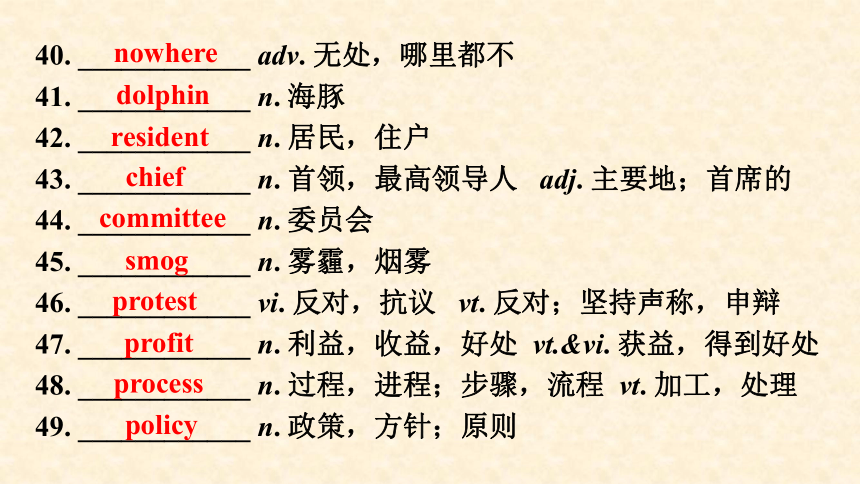
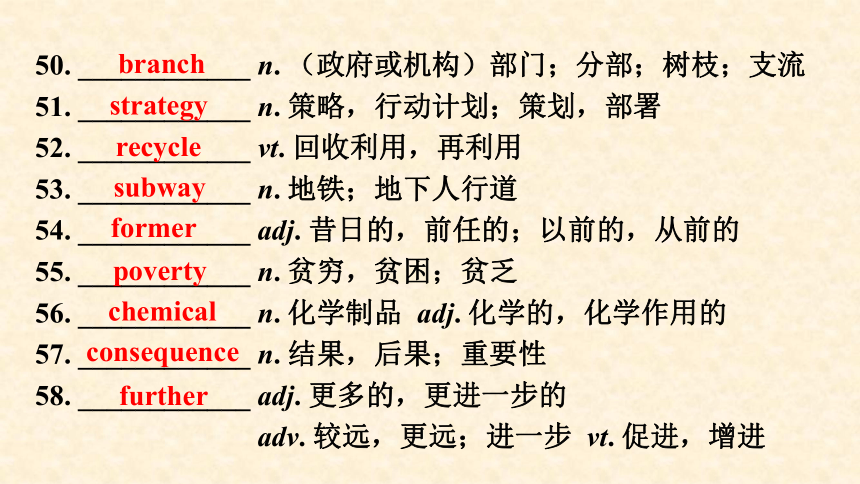
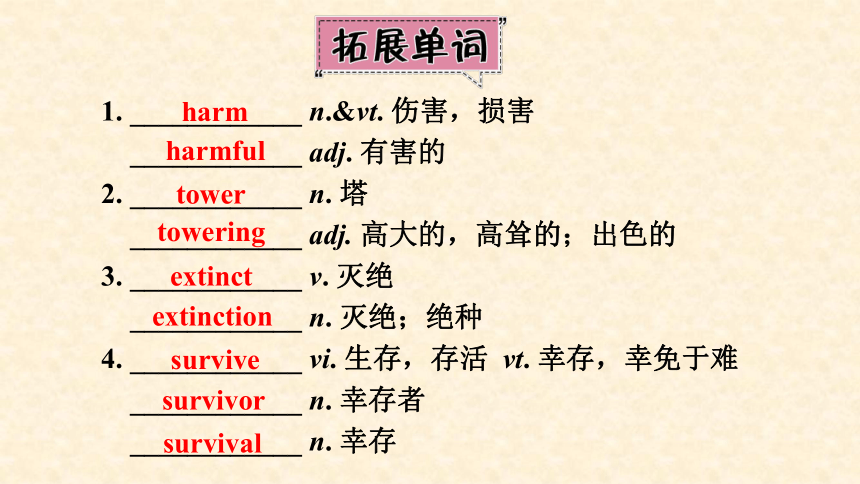
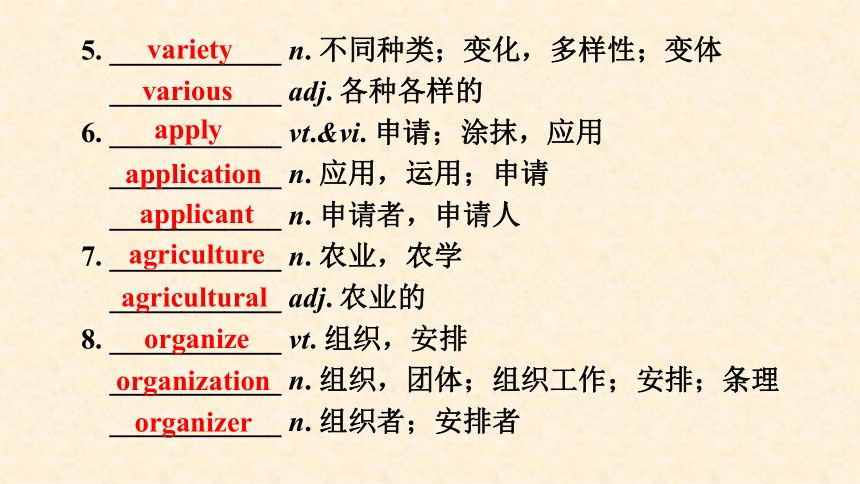
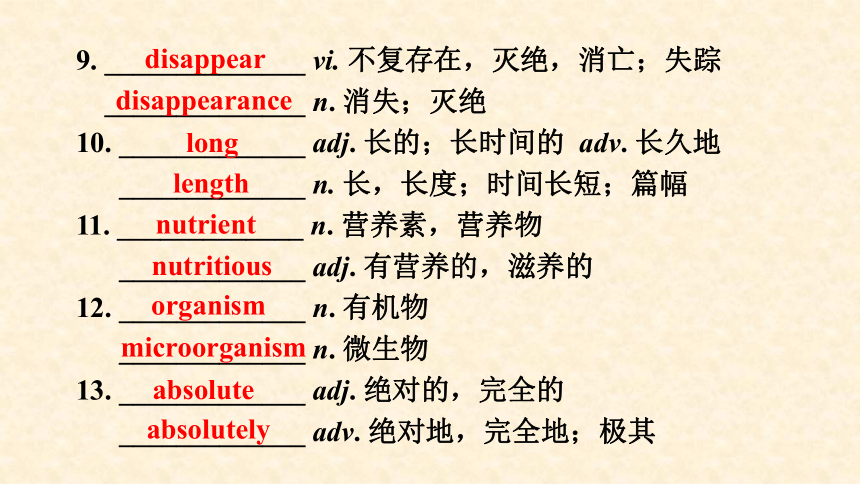
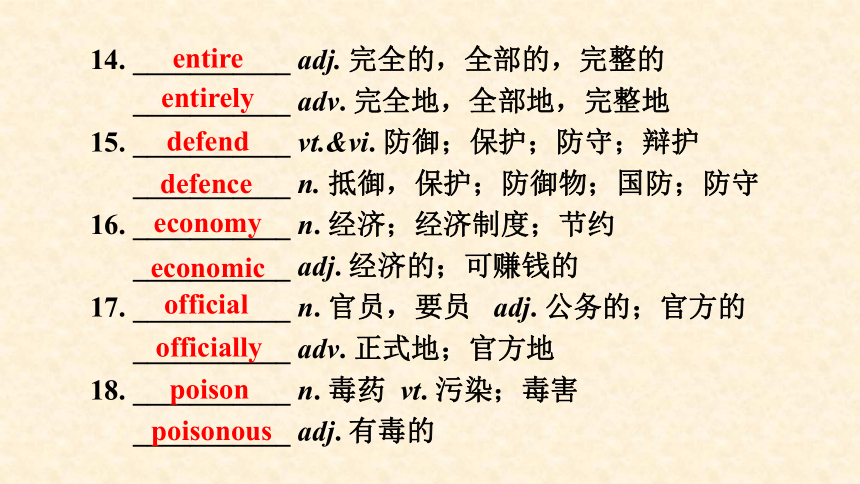
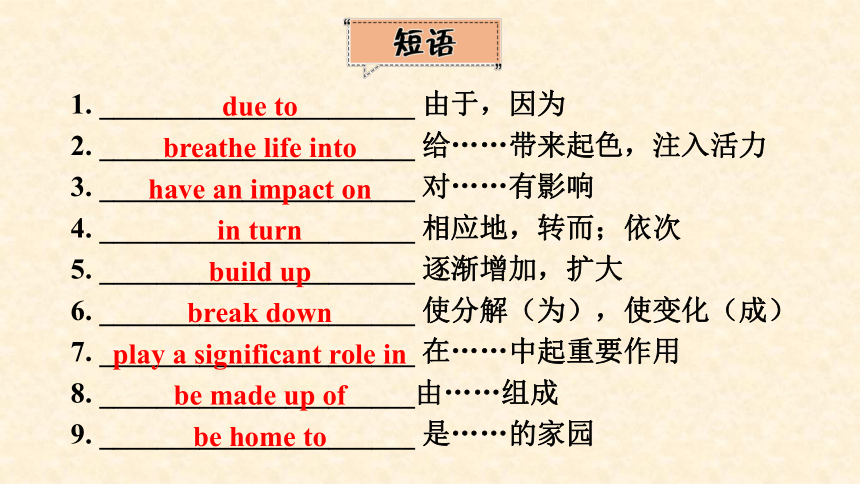
文档简介
(共98张PPT)
牛津新教材必修3
Unit 1 Nature in the balance
1. ___________ n. 土壤;国土,领土,土地
2. ___________ n. 生态系统
3. ___________ adj. 海外的,国外的 adv. 在海外,向国外
4. ___________ n. 地区,区域;行政区
5. ___________ n. 大陆,陆地,洲
6. ___________ num. 一百万;许多,大量
7. ___________ n. 生物多样性
8. ___________ n.种,物种
9. ___________ n. 坚果
soil
ecosystem
overseas
region
continent
million
biodiversity
species
nut
10. ____________ n. 百合(花) water lily 睡莲
11. ____________ n. 野生动植物,野生生物
12. ____________ prep. 在……下面,在……下方;配不上
13. ____________ n. 大量;堆;一大群 adj. 大批的;广泛的
14. ____________ n.阔叶树;硬材
15. ____________ adj. 活着的;在使用的 n. 谋生;生活方式
16. ____________ n. 哺乳动物
17. ____________ n. 美洲豹,美洲虎
18. ____________ n. 蛙,青蛙
19. ____________ n. 昆虫
lily
wildlife
beneath
mass
hardwood
living
mammal
jaguar
frog
insect
20. ____________ n. 碳
21. ____________ n. 氧,氧气
22. ____________ adv. 因此,从而;这样
23. ____________ n. 牛
24. ____________ n.影响,作用;撞击 vi.&vt. 有影响;冲击
25. ____________ vt.&n. 损害,伤害,损坏,破坏
26. ____________ n. 气候;倾向,风气
27. ____________ adj. 全球的;全面的
28. ____________ n. 温室,暖房
29. ____________ n. 气体;煤气;汽油
carbon
oxygen
thus
cattle
impact
damage
climate
global
greenhouse
gas
30. ____________ n. 旱灾;久旱
31. ____________ n. 小册子
32. ____________ n. 地带,地区;腰带;传送带
33. ____________ n. 奖章,勋章
34. ____________ n.形象;图像;意象
35. ____________ n. 鲨鱼
36. ____________ n. 鲸
37. ____________ n. 鹿
38. ____________ n. 足迹,踪迹;小道;轨道;跑道;路线
vt.&vi. 跟踪,追踪
39. ____________ n. 生活环境;栖息地
drought
brochure
belt
medal
image
shark
whale
deer
track
habitat
40. ____________ adv. 无处,哪里都不
41. ____________ n. 海豚
42. ____________ n. 居民,住户
43. ____________ n. 首领,最高领导人 adj. 主要地;首席的
44. ____________ n. 委员会
45. ____________ n. 雾霾,烟雾
46. ____________ vi. 反对,抗议 vt. 反对;坚持声称,申辩
47. ____________ n. 利益,收益,好处 vt.&vi. 获益,得到好处
48. ____________ n. 过程,进程;步骤,流程 vt. 加工,处理
49. ____________ n. 政策,方针;原则
nowhere
dolphin
resident
chief
committee
smog
protest
profit
process
policy
50. ____________ n. (政府或机构)部门;分部;树枝;支流
51. ____________ n. 策略,行动计划;策划,部署
52. ____________ vt. 回收利用,再利用
53. ____________ n. 地铁;地下人行道
54. ____________ adj. 昔日的,前任的;以前的,从前的
55. ____________ n. 贫穷,贫困;贫乏
56. ____________ n. 化学制品 adj. 化学的,化学作用的
57. ____________ n. 结果,后果;重要性
58. ____________ adj. 更多的,更进一步的
adv. 较远,更远;进一步 vt. 促进,增进
branch
strategy
recycle
subway
former
poverty
chemical
consequence
further
1. ____________ n.&vt. 伤害,损害
____________ adj. 有害的
2. ____________ n. 塔
____________ adj. 高大的,高耸的;出色的
3. ____________ v. 灭绝
____________ n. 灭绝;绝种
4. ____________ vi. 生存,存活 vt. 幸存,幸免于难
____________ n. 幸存者
____________ n. 幸存
harm
harmful
tower
towering
extinct
extinction
survive
survivor
survival
5. ____________ n. 不同种类;变化,多样性;变体
____________ adj. 各种各样的
6. ____________ vt.&vi. 申请;涂抹,应用
____________ n. 应用,运用;申请
____________ n. 申请者,申请人
7. ____________ n. 农业,农学
____________ adj. 农业的
8. ____________ vt. 组织,安排
____________ n. 组织,团体;组织工作;安排;条理
____________ n. 组织者;安排者
variety
various
application
apply
applicant
agriculture
agricultural
organize
organization
organizer
9. ______________ vi. 不复存在,灭绝,消亡;失踪
______________ n. 消失;灭绝
10. _____________ adj. 长的;长时间的 adv. 长久地
_____________ n. 长,长度;时间长短;篇幅
11. _____________ n. 营养素,营养物
_____________ adj. 有营养的,滋养的
12. _____________ n. 有机物
_____________ n. 微生物
13. _____________ adj. 绝对的,完全的
_____________ adv. 绝对地,完全地;极其
disappear
disappearance
long
length
nutrient
nutritious
organism
microorganism
absolute
absolutely
14. ___________ adj. 完全的,全部的,完整的
___________ adv. 完全地,全部地,完整地
15. ___________ vt.&vi. 防御;保护;防守;辩护
___________ n. 抵御,保护;防御物;国防;防守
16. ___________ n. 经济;经济制度;节约
___________ adj. 经济的;可赚钱的
17. ___________ n. 官员,要员 adj. 公务的;官方的
___________ adv. 正式地;官方地
18. ___________ n. 毒药 vt. 污染;毒害
___________ adj. 有毒的
entire
entirely
defend
defence
economy
economic
official
officially
poison
poisonous
1. ______________________ 由于,因为
2. ______________________ 给……带来起色,注入活力
3. ______________________ 对……有影响
4. ______________________ 相应地,转而;依次
5. ______________________ 逐渐增加,扩大
6. ______________________ 使分解(为),使变化(成)
7. ______________________ 在……中起重要作用
8. ______________________由……组成
9. ______________________ 是……的家园
due to
breathe life into
have an impact on
in turn
build up
break down
play a significant role in
be made up of
be home to
10. ____________________ 以……为生
11. ____________________ 负担得起……,承担得起
12. ____________________ 事实上
13. ____________________
____________________ 一方面……另一方面……
14. ____________________ 吸收;理解;欺骗;收留
15. ____________________ 允许某人做某事
16. ____________________ 想出,想到
17. ____________________ (公开)要求;需要
18. ____________________ 突然记起(或想到)
19. ____________________ 使发生(或存在)
20. ____________________ 摆脱,丢弃,扔到
feed on
afford to
in fact
for one thing… for another thing
take in
allow sb. to do sth.
come up with
call for
spring to mind
give rise to
get rid of
2. 介词+关系代词引导的定语从句
The Amazon River, from which the rainforest gets its name, is close to 6,400 kilometers in length — roughly 100 kilometres longer than the Yangtze River. (P2)
1. 倍数表达
With an area of around 6 million square kilometres, the Amazon rainforest is more than half the size of China. (P2)
4. even though引导让步状语从句
We’ve been taking various measures … even though these measures raise our production costs. (P11)
3. 完全倒装
Above that is the mass of leaf litter on the dark forest floor. (P3)
1. harm n. 损害; 危害; 伤害 v. 损害; 伤害
The human race had done much harm. (P1)
do sb. harm 对某人有害
do harm to ... 对……有害
come to harm 受到损害,遭到不幸
harmful adj. 有害的
be harmful to … 对……有害处
harmless adj. 无害的
be harmless to … 对……无害的
【语境应用】完成/翻译句子。
1) The child fell over but ________ ________ ________ ________ (没伤着).
2) It wouldn’t ________ ________ ________ ________ (对他有任何害处) to work harder.
3) Come in please. Our dog ________ ________ ________ (不会伤害你).
4) 这个试验不会对动物造成伤害。
This experiment was harmless to the animals.
won’t harm you
came to no
harm
do him any harm
2. variety n.(同一事物)不同种类,多种式样;变化;多样性;多变性(植物、语言等) 变种; 变体; 异体; 品种
The forest’s different levels support an unbelievable variety of wildlife. (P3)
a variety of/varieties of 各种各样的。后接可数名词复数和不可数名词。+可数名词复数作主语时,谓语动词多用复数形式,偶尔也可用单数形式。
variety可用wide/great/large修饰。
the variety of +复数名词作主语时,谓语动词用单数形式。
vary v. 使某事物有变化, 改变某事物;相异, 不同, 有别
vary in ... 在……方面不同
vary with 随着……而变化
vary from … to …/vary between ... and ...
由……到……情况不等
variable adj. 可变的,变化无常的
various adj. 各种各样的,不同的
varied adj. 不同的,各式各样的
【语境应用】完成句子。
1) 这些花的颜色和大小都不相同,但它们都很漂亮。
The flowers ________ ________ ________ ________ ________ but all of them are beautiful.
2) 这家宾馆每个房间的费用由20美元到30美元不等。
The charge for a room in this hotel ________ ________ $20 ________ $30.
3) More and more people choose to shop in a supermarket as it offers ________ ________ ________ ________ ________ (各种各样的商品).
vary in color and size
varies between
and/
varies from; to
a great variety of goods
4) 一般来说,水果和蔬菜的价格随季节变化而变化。
Generally speaking, prices of fruit and vegetables ________ ________ ________ ________.
5) 试着不要每句话都以“The”开头。让你的句子的开头有所不同。
Try not to start every sentence with “The”. ________ ________ __________ ________ your sentences.
the beginnings of
vary with the season
Vary
a mass of / masses of 大量,许多
the mass of … ……中的大多数
the masses 群众
3. mass n. 团,块,堆;大量;许多;(常指混乱的)一群; 一堆
Above that is the mass of leaf litter on the dark forest floor.
(P3)
mass adj. 大批的, 广泛的
【语境应用】完成句子。
1) ________________ (大量数据) we collected is all stored in the computer.
2) There is ___________________ (一大团白云) in the sky.
3) From this earthquake, we realized that ____________________ (群众的力量) is endless.
A mass of data
a mass of white cloud
the power of the masses
4. living adj. 活着的;活的在;使用的;在实施的
n. 生计;谋生;收入;生活方式
Each level of the forest forms its own little world, home to different kinds of living things. (P3)
lively, alive, live
alive adj. 活着的。常作表语、后置定语或补语。
e.g. Who is the greatest poet alive
lively adj. 活泼的, 活跃的, 生动的。作定语或表语。
e.g. Her story about her life in Africa was lively and interesting.
live v. 居住;过……的生活 adj. 活的 (与dead相对)
adj. & adv. 现场直播,现场表演
e.g. The couple are living a peaceful life in the countryside.
This is a live tiger. Don’t get too close to it.
The club has live music most nights.
【语境应用】完成句子。
1) The sport is still very much ________ (alive / lively) in this country.
2) She’s a ________ (live / lively) child and popular with everyone.
3) It was a really bad accident — they’re lucky to be ________ (alive / lively).
4) The sun affects all ________ (living / alive) things — people, animals, and plants.
5) It’s always different when you perform in front of a(n) ________ (alive / live) audience.
live
alive
lively
alive
living
5. survive v. 生存; 存活, 继续存在;幸存; 幸免于难; 艰难度过
While a significant number of jaguars survive here, they are only one element of this forest's food chain. (P3)
survive from+ 时间 从……存留下来
survive on sth. (=live on sth.) 依靠……生活
survive sth. 幸免于……,从……中艰难度过
survive sb. by… 比某人多活……
survival n. 幸存,生存,存活
survivor n. 幸存者,生还者
【语境应用】完成/翻译句子。
1) Mastering some basic skills will greatly increase your chances of ________. Last week thanks to the skills he and his friend succeeded in __________ the severe floods and they were the only two ___________ (survive)
2) My grandma passed away last year and she survived my grandpa ________ ten years.
3) The passengers __________________ (在事故中幸存下来了).
4) These plants cannot survive in very cold conditions.
这些植物在寒冷的条件下无法生存。
survival
surviving
survivors
by
survived the accident
6. impact n. 作用,影响;撞击,冲撞
v. 有影响,有作用;冲击
As the impact of human activities continues to grow and the list of species in danger of extinction becomes longer, we are left with a question: can we afford to damage the “lungs of the planet” (P3)
have/make/leave impact on/upon 对……产生影响
have no impact on 对……没有影响
have/make/leave an effect/influence on/upon 对……有影响
make a difference (to) 对……有影响
【语境应用】完成句子。
1) They say they expect the meeting to have a marked impact/effect ________ the future of the country.
2) Her father’s death impacted greatly ________ her childhood years.
3) The sea air has made a difference ________ her health.
4) We can observe that artificial intelligence has already _________________________ (对我们的生活产生了影响) in many ways.
on
on
to
made an impact on out lives
damage n. 损害,破坏,损失(常与to连用);伤害
(法院判定的)损害赔偿金(常用复数形式)
v. 损害,伤害,毁坏,破坏
suffer damage 遭受损坏
do/ cause damage to 给……造成损坏
【语境应用】完成句子。
1) The factory will be closed, which will ________ ________ ________ ________ (给……引起巨大的损失) the local economy.
2) He ________ ________ _________ (得到了五万美元的赔偿金) from his company for the loss of his right arm while at work.
3) The earthquake which happened last night _________ ________ _________ (毁坏了很多建筑物).
4) The president’s speech has ________ ________ ________ (破坏了关系) between the two countries.
damaged the relations
cause great
got $50,000 damages
buildings
damaged many
damage to
damage多指对无生命物体的损害,造成降低价值、破坏功能等后果;
destroy多指彻底地、毁灭性地破坏,含导致无用,不能或很难再修复的意味;
ruin多指因外部原因而受到严重破坏或毁灭,侧重破坏的彻底性,也可用于引申意义。
destroy, damage, ruin
【语境应用】用damage, destroy, ruin完成句子。
1) Most of the old part of the city was __________ by bombs during the war.
2) The fire badly __________ the town hall.
3) Her injury ___________ her chances of winning the race.
ruined
damaged
destroyed
7. track v. 跟踪, 追踪
n. (人踩出的) 小道,小径;(人、动物或车辆留下的)足迹,踪迹;车辙; 轨道,(赛跑、赛车等的)跑道;(移动的)路径, 路线, 方向
Still others hunt animals just for fun: deer are tracked and shot by people who enjoy the excitement of the sport. (P8)
keep track of 了解……的动态;与……保持联系
lose track of 不了解……的动态;与……失去联系
on the track 在轨道上
【语境应用】完成句子。
1) 这个研究项目是要追踪400名学生的学习(情况)。
The research project is to _________ the study of 400 students.
2) My mother is trying ________________ (了解……的动态) the money we’re spending.
3) The police have ______________ (与……失去联系) the criminals.
track
lost track of
to keep track of
8. nowhere adv. 无处,哪里都不。
位于句首时,句子用倒装语序。
… leave many animals with nowhere to live, or no food to eat. (P8)
go / get nowhere 毫无进展;一无所获
lead / get (sb.) nowhere 没有结果
nowhere to be seen 哪儿也看不到
nowhere near 离……差得远,远谈不上
【语境应用】完成句子。
1) There’s _________________ (没有别的地方) I really want
to go to.
2) It’s ________________ (离……差得远) the collar I’m
looking for.
3) 哪里都找不到这样便宜的房子了。
Nowhere else _________________ such a cheap house.
nowhere else
nowhere near
can one find
9. protest v. (公开)反对;抗议 (+about/against/at)
坚决地表示;申辩 (+名词或从句)
n. 抗议, 抗议书(行动); 反对
Mr Smith protested against heavy industry. (P11)
without protest 乖乖地,毫不反对地
under protest 无奈地,不服气地
【语境应用】完成句子。
1) The workers went on strike __________(protest) against the economic policy of the government.
2) I ___________________________________ (我抗议受到这样的待遇).
3) He _______________________________________ (抗议说开车旅行太远了).
4) I turned off the TV, despite ________________________ (孩子们大声反对).
to protest
loud protests from the kids
protest against being treated in this way
protested that the journey was too far by car
10. profit n. 利润,收益;赢利;好处,利益
v. 获益;得到好处;对……有益(或有用)
… irresponsible businessmen eager to make huge profits. (P11)
make/earn a profit 盈利
A profit B = B profit from A A使B获益(B从A中获益)
profitable adj. 有利可图的;有益的
【语境应用】 翻译句子。
1) 通过卖废品,她获利颇丰。
2) John在国外呆了一年,受益匪浅。
3) 合并这两个工厂会更有利可图。
4)他们每售出一本获利十元.
She makes a big profit from selling waste materials.
John profited greatly from spending a year abroad.
It would be more profitable to combine the two factories.
They make a profit of ten yuan on every copy they sell.
11. defence n. 防御,保卫;防御物;防御能力;国防
In defence of the factories, however, I’d like to point out that we also try to control the amount of pollution we produce. (P11)
in defence of 为了保卫……;为了……辩护
in one’s defence 为某人辩护
defend v. 防御, 保护; 辩解, 辩白
defend oneself 为自己辩护; 自卫
defend sb. /sth. from/against … 保卫……免于
defensive adj. 防御的, 保护的, 保卫的
【语境应用】完成句子
1) When the dog attacked me, I _________ ________ (自卫) with a stick.
2) You should ________ ________ ________ ________ (保护自己以免受伤).
3) The town walls were built ________ ________ ________ ________ ________ ________ (作为屏障以防御敌人袭击).
4) The soldiers fought ________ ________ ________ ________ ________ (为保卫祖国).
in defence of
defended myself
defend yourself against injury
as a defence
their country
against enemy attacks
12. process n. 过程, 进程;步骤, 流程;做事方法; 流程; 工序
v. 加工;处理
We’ve been taking various measures, … to reduce pollution in the production process… (P11)
in the process of (doing) sth. 在(做)某事的过程中
in the process 同时,在……过程中
in process 在进行中
【语境应用】完成句子。
1) All the information was then ready ________________ (process) into film negatives.
2) More than 100 applications for travel visas have to be _____________ (process).
3) The company is ___________________ (在……过程中) moving to new offices.
to be processed
processed
in the process of
1. in turn 相应地,转而,反过来;依次
These frogs, in turn, feed on insects which eat leaves and fruit. (P2)
in one’s turn 轮到某人;接着
take turns to do sth./ (in) doing sth. 轮流做某事
It’s one’s turn to do sth. 轮到某人做某事
by turns 交替地; 轮流
It turns/ turned out that… 结果是……
【语境应用】完成句子。
1) It’s my turn _________ (deliver) a speech in public.
2) They took care of their sick father ______ turns.
3) When it was ______________ (轮到我), I was too excited to speak.
4) People try to avoid public transportation delays by using their own cars, which ____________ (反过来) creates more problems.
to deliver
by
in my turn
in turn
2. break down 使(分解)为; 使(变化)成;(机器或车辆)故障;坏掉;失败;被搞垮;破坏(感情或态度)
When a jaguar dies, a tiny army of microorganisms helps break down its body and return the nutrients to the earth. (P2)
break into 强行进入;打断
break off 中断
break out 突发, 爆发
break through 突破, 突围
break up 打碎;分裂;分手
break away (from) 挣脱;脱离
【语境应用】用break的短语完成句子。
1) The lift ______________, so we had to walk up the stairs.
2) When we gave her the bad news, she ______________ and cried.
3) A fire ______________ in this hotel last night and three people were killed.
4) Mary and Jane were good friends, but then they had a quarrel and ______________.
5) Scientists think they are beginning to ______________ in the fight against cancer.
broke up
broke down
broke down
broke out
break through
3. build up 加强(力量),增强(体质);建立, 开发;积累, 积聚;逐渐增强, 变得严重起来
… it is difficult for the soil to build up enough nutrients. (P2)
【语境应用】 翻译下面句子。
1) Taking exercise will build up your strength.
2) Traffic is building up on roads into the city.
3) We’ve built up good relationships with our customers.
锻炼将增强你的体质。
来往的车辆在通往市区的道路上越聚越多。
我们与我们的顾客之间已经建立起良好的关系。
4. due to 由于;因为;语气;到期;应归于
Over the past 50 years, about 17 per cent of the rainforest has disappeared due to human activities such as agriculture and cattle farming. (P3)
be due to do sth 预定做某事
be due to sb 应支付/给予/归于某人
be due to sth 由于/因为某事
due to一般只用作表语。
because of只能用作状语。
owing to既可以用作状语,也可以用作表语,平常多用于前一种情况,它引导的状语必须是修饰全句的,因此严格来讲应用逗号和主句分开。
thanks to幸亏,只能用作状语,可以表达正面意思,也可用于讽刺口吻中(讽刺口吻的“感谢”)。
due to, thanks to, because of, owing to
【语境应用】完成/翻译句子。
1) The policeman said the accident last night was ___________________ driving.
警察说昨晚的事故是由于粗心驾驶造成的。
2) His new book ___________________ next year.
他的新书预计明年出版。
3) 运动会因下雨而推迟了。
4) 来访的总统预计要参观几处工厂。
due to careless
is due to be published
The sports meeting has been put off due to the rain.
The visiting president is due to visit several factories.
5. come up with 想到,提出
All of them come up with creative ideas on how to solve these problems. (P6)
come up with及物动词短语,人作主语;
come up(被提到)不及物动词短语, 物作主语, 不用于被动语态。
come into being 形成, 存在
come around 恢复知觉, 苏醒; 再度发生, 再次出现
come up 破土而出; (太阳)升起; 被提及, 被讨论
come about 发生;产生
come across 被理解, 被弄懂; (偶然), 发现
come back 回来, 返回; 再度流行, 再次成功
come down 崩塌, 坍塌; 落下, 降落; 下降, 降低
come out (太阳、月亮或星星) 出现; 开花; 出版, 发表
【语境应用】用含come的短语的适当形式填空。
1) No one knows when such a custom first _______________.
2) He is asking for 5,000, but he may be willing to ______________ to 4,800.
3) He spoke for a long time but his meaning did not really ______________.
4) When the girl ______________, she found herself lying on the back seat of a car.
5) Several of the members have ______________ suggestions of their own.
came into being
come down
come across
came around
come up with
6) Our problems _______________ because we ignored the advice of experts.
7) Martha has left us, and there is nothing we can do to persuade her to _______________.
8) When important questions _______________, the members often argue with each other fiercely.
9) His book first _______________ in 1868, and soon became one of the world’s best selling novels.
came out
came about
come back
come up
6. call for 需要;(去)接;(公开)要求
Some call for the application of modern technology, and others a change of lifestyle. (P6)
call up 给……打电话; 使……回忆起
call at 停靠; (短时间)停留
call off 取消; 停止
call in 请求; 收回
call on/upon 拜访(某人); 号召
【语境应用】完成句子。
1) The sound of happy laughter ___________ (使回忆起) memories of his childhood.
2) The government __________ (号召) the youth to donate their blood voluntarily.
3) Since the weather is bad, let’s __________ (取消) the trip.
4) He is ill; you should __________ (请来) a doctor right away.
5) A truck driver used his radio ____________ (呼救).
6) He is unfit for the job, which __________ patience and creativeness.
called up
calls on
call off
call in
call for help
call for
7. had planned to do sth. 本打算做某事,但是没做成
He had planned to borrow a book on environmental
protection, but he didn’t. (P6)
hope, expect, think, intend, mean, want, suppose, plan 等用过去完成时,表示未实现的愿望、打算和意图。
e.g. We had hoped to be able to come and see you.
我们本来希望能来看看你。
I had never thought that you were content to help me.
我从未想过你愿意帮我。
8. spring to mind 马上想到, 突然记起(或想到)
When you think of a fearsome hunter, images of lions and
sharks may spring to mind. (P8)
spring into action, spring into/to life
突然工作(或行动)起来
bear / keep … in mind 记住……
lose one’s mind 失去理智……
bring … to mind 使……想起
come to mind 突然想起
change one’s mind 改变主意
make up one’s mind 打定主意;下定决心(mind的形式随one的单复数变化而变化)
concentrate one’s mind on / upon …
集中注意力于……;专注于……
【语境应用】用mind短语的适当形式完成句子。
1) _____________ that if you are in trouble, you can ask me to help you.
2) Why do you ________________ again and again
3) Both of the two dresses look wonderful — I can’t _________________.
4) If you refer to “Hawaii”, a vision of pretty beaches and
blue seas may ______________.
made up my mind
change your mind
Keep in mind
spring to mind
be rid of sth./sb. 摆脱某人/某事物
rid sb. / sth. of sb. / sth. (formal) 去除,清除
rid oneself of sb. / sth. 摆脱, 从……中解脱
9. get rid of 摆脱,丢弃,扔掉
The smog in the air has colored the sky a smoky grey; it’s also given me a cough that I can’t get rid of. (P11)
【语境应用】完成句子,使两句话的意思相同或相近。
1) It is not easy for him to get rid of the bad habit.
It is hard for him to _______ _______ _______ the bad habit.
2) John plans to give up smoking in two months.
John plans to ________ ________ ________ smoking in two months.
rid himself of
get rid of
/rid himself of
1. 倍数表达
With an area of around 6 million square kilometres, the Amazon rainforest is more than half the size of China. (P2)
两倍twice;三倍或三倍以上:基数词+times
注意倍数的位置;倍数部分也可用分数、百分数代替。
A is +倍数+ the size/weight/height/length/width…+ of B
A is +倍数+ as + adj./adv.原级 + as B
A is +倍数+ adj./adv.原级 + than B
A is +倍数+ what 从句
【语境应用】用不同的倍数表达完成句子。
这条河是我们城市那条和的四倍长。
1) The river is ____________________ the one in our city.
2) The river is ____________________ the one in our city.
3) The river is ____________________ the one in our city.
four times longer than
four times as long as
four times the length of
2. 介词+关系代词引导的定语从句
The Amazon River, from which the rainforest gets its name, is close to 6,400 kilometers in length — roughly 100 kilometres longer than the Yangtze River. (P2)
1) “介词+关系代词” 结构中,关系代词只用whom(先行词为人),which(先行词为物),whose(所属关系)。
2) “介词+关系代词” 可引导限制性定语从句和非限制性定语从句。
3) 在限制性定语从句中,介词放关系代词之前时,关系代词不能省;若介词后置时,可用that代替which,who代替whom,也可省略关系代词。
4) 介词的选择:一先:先行词的习惯搭配;二动:定语从句中动词或形容词所需的习惯搭配;三意义:定语从句的意义。
【语境应用】完成句子。
1) Life is not fairy tales __________ everyone will have a happy ending.
2) Leave him a note at the reception desk, __________ he will learn how to find you.
3) The course normally attracts about 100 students per year, __________ up to half will be from abroad.
4) They also had a small pond __________ they raised fish.
in which
from which
of whom
in which
3. 完全倒装
Above that is the mass of leaf litter on the dark forest floor. (P3)
介词短语above that放句首,句子用完全倒装。
完全倒装:讲句子中的谓语动词全部置于主语前,常用于一般现在时和一般过去时,不用于进行时或将来时。
Language points
1) 当表示方向、地点、时间的副词、介词短语there, here, out, in, up, down, now, then, away, off, out, in the room, on the wall等位于句首,且主语是名词时,句子要用完全倒装语序。
2) 当主语是人称代词时, 不用倒装语序。
3) such置于句首时,后面的句子用完全倒装。
4) 表语(分词、不定式、形容词、介词短语等)前置,句子用全部倒装。
【语境应用】完成句子。
1) —Is everyone here
—Not yet ... Look, here _________________________ (其他的客人来了).
2) John opened the door. There ____________ (站着一位女孩) he had never seen before.
3) The door opened and in _________________.
门开了,观众涌了进来。
come the rest of our
stood a girl
guests
rushed the audience
4) ____________________a doctor on the train.
这列火车上碰巧有一位大夫。
5) Look!Here__________________.
瞧!老师来了。
There happened to be
comes the teacher
4. even though引导让步状语从句
We’ve been taking various measures … even though these measures raise our production costs. (P11)
even though(= even if) 引导让步状语从句
在含有 even though, even if引导的让步状语从句的复合句中,如果主句用将来时,从句则用一般现在时代替将来时。
【语境应用】单项选择。
Tim is in good shape physically ______ he doesn’t get much exercise.
if B. even though
C. unless D. as long as
B
一、简单句中的省略
1. 省略主语:主要是祈使句中的you。
(You) Come in, please!
2. 省略主语和谓语:主谓都很明确,为了简化或显得亲切,可将主谓(或谓语一部分)同时省略。
(You come) This way, please!
(Are you) OK
3. 省略宾语: 当前后两个句子宾语一致时, 后句常省略宾语。
—Do you know Miss Gao
—I don’t know (her).
省略句
二、并列句中的省略
在由and或but连接的并列句中,常省略重复的部分。
省略共同的主语或宾语。
Tom picked up a book on the floor and (Tom) handed it to
his teacher.
2. 若主语不同,而谓语部分的系动词、助动词或情态动词相
同,则省略后面相同的部分。
Jack must have been playing football and Mary (must
have been) doing her homework.
3. 若主谓相同,省略后面的主谓成分。
His advice made me happy, but (his advice made) Jim
angry.
4. 若主语不同,但主要动词及后续部分相同,则省略主要动
词及后续部分。
He has a knowledge of first aid but his friend doesn’t
(have a knowledge of first aid).
三、主动复合句中的省略
状语从句的省略
(1) 在when, while, if, as if, though, although, as, until, once,
whether, unless, whenever等引导的状语从句中,当从句
主语和主句的主语相同且从句谓语中含有系动词be或从
句的主语为it时,从句中主语和be动词常被省略。
You’d better look out when (you are) crossing the street.
Wood gives off much smoke while (it is) burning.
Whenever (it is) possible, they would stop him and ask
him the three questions.
(2) 当比较状语从句的谓语与主句相同时,从句中的谓语常
被省略。
He runs as fast as Bob (runs).
They don’t use more water than (it is) necessary.
2. 定语从句的省略
(1) 在限制性定语从句中,作宾语用的关系代词whom, who, which, that可省略。
The exact year (which/ that) Angela and her family spent
together in China was 2008.
He is the man (who/ whom/ that) you can depend on.
(2) 修饰way的关系词that/ in which可以省略。
The way (in which/ that/ /) he speaks to us is really
annoying.
3. 宾语从句的省略
(1) 由that引导的宾语从句,that一般可以省略;但如果动词
接两个或两个以上that引导的宾语从句时,that可以省略。
He said (that) the text was very important and that we
should learn it by heart.
(2) when, where, how和why引导的宾从有时可以仅保留引导词。
I know that a movie star will come to our city but I don’t know
when (he will come to our city).
四、其他的省略
1. 不定式作某些动词的宾语补足语或主语补足语,且在上文中
已经出现时,可省略to后面的成分,这些动词常见的有:
ask, tell, advise, force, persuade, wish, allow, permit, forbid,
expect, order, warn等。如:
The boy wanted to ride his bicycle in the street, but his
mother told him not to (ride it).
2. 在感官动词后作宾语补足语的不定式省略to。
I saw the car (to) drive up outside the police station.
3. 在使役动词make, let, have等后作宾语补足语的不定式省略to。
4. 在rather than等表示“与其……不如”短语后的不定式省
略to。
5. 介词but / except前边有实义动词do的某种形式时,其后的
不定式省略to。
He can do nothing but / except lie down and sleep.
6. 在can not but do sth.,can’t choose but do sth.,can not
help but do sth.句式中,but后跟的不定式(短语)省略to。
7. 习惯上的省略
由固定短语引导的疑问句。
What about having a game of chess
What if it’s raining
习惯性的交际用语。
Not at all.
No matter.
Thanks.
【语境应用】简化画线部分。
① He put the money on the table and he sat down. The woman looked over at him and smiled. ② Her smile said she was in charge and she could take his money if she wanted to take his money. Of course she could, he thought, but obviously she didn't want to yet. The smile lingered (停留) for a moment or two longer, then disappeared.
①________________________________________________
②________________________________________________
________________________________________________
He put the money on the table and sat down.
Her smile said she was in charge and she could take his money if she wanted.
“③ I asked you to pay me a thousand and you agreed to pay me a thousand. This is only five hundred.”
“④I'll give you half of your thousand now and I'll give you the other half of your thousand later when I get the orchid (兰花).”
③ ______________________________________________
④ ______________________________________________
______________________________________________
I asked you to pay me a thousand and you agreed.
I’ll give you half of your thousand now and the other when I get the orchid.
“I could find someone else who'd want to buy it.”
“⑤ You won't find someone else who'd want to buy it. Nobody else is even looking for this orchid.”
⑤___________________________________
You won’t.
如何写英文倡议书
假定你是某校英语俱乐部主席李华,最近你发现很多同学在离开俱乐部时经常会忘记关灯或关空调等电器electrical appliance。请以俱乐部的名义用英语写一封倡议书,倡导大家节约用电。
注意:词数100左右。
Save electricity, protect the environment
Dear fellow students,
________________________________________________________ The English Club
一、审题定调
写倡议书,体裁属于应用文。倡议书是为了开展某项工作、完成某项任务或进行某项活动而倡议大家一起做某事,或提出合理化建议、意见时使用的一种文体。
倡议书一般由标题、称呼、正文、结尾、落款五部分组成。正文一般包括倡议书的背景、目的、倡议的具体内容和要求。结尾一般表明倡议者的决心和希望,做出总结或再次呼吁大家采取行动。
时态以一般现在时为主,人称以第一或第二人称为主。
二、谋篇布局
第一部分:说明浪费电力资源的现象;
第二部分:提出节约用电的建议;
第三部分:重申态度,发出号召。
三、倡议书的常用表达
Recently, I noticed that ..., which not only ... but also ...
It is a common phenomenon (现象) that ...
... is common in ... especially in ...
... is a serious problem in ...
说明现象
We should / can / have to / must ...
... is the first step.
... is necessary / important.
It is necessary for us to ...
Don’t ...
I advise that ...
I strongly suggest that ...
It would be better if we ...
提出建议
重申态度,发出号召
It is everyone’s duty to ... and it is time to take action!
These personal changes might seem small, but they will all add up.
Let’s take action from now on!
Let’s start right now and try our best to ...!
Save electricity, protect the environment
Dear fellow students,
Recently, I noticed that many students leave our club with the light or the air-conditioner still on, which not only damages electrical appliances, but also is a waste of valuable resources. Therefore, making some changes is a must for us.
First, it is necessary for us to understand the importance of saving energy and rethink our behavior. Then, draw back the curtains and open the windows. We can save electricity by enjoying more natural light instead of electric lights.
Finally, turn off electrical appliances, such as air-conditioners and computer equipment when not using them.
These personal changes might seem small, but they will all add up. Let’s take action from now on!
The English Club
牛津新教材必修3
Unit 1 Nature in the balance
1. ___________ n. 土壤;国土,领土,土地
2. ___________ n. 生态系统
3. ___________ adj. 海外的,国外的 adv. 在海外,向国外
4. ___________ n. 地区,区域;行政区
5. ___________ n. 大陆,陆地,洲
6. ___________ num. 一百万;许多,大量
7. ___________ n. 生物多样性
8. ___________ n.种,物种
9. ___________ n. 坚果
soil
ecosystem
overseas
region
continent
million
biodiversity
species
nut
10. ____________ n. 百合(花) water lily 睡莲
11. ____________ n. 野生动植物,野生生物
12. ____________ prep. 在……下面,在……下方;配不上
13. ____________ n. 大量;堆;一大群 adj. 大批的;广泛的
14. ____________ n.阔叶树;硬材
15. ____________ adj. 活着的;在使用的 n. 谋生;生活方式
16. ____________ n. 哺乳动物
17. ____________ n. 美洲豹,美洲虎
18. ____________ n. 蛙,青蛙
19. ____________ n. 昆虫
lily
wildlife
beneath
mass
hardwood
living
mammal
jaguar
frog
insect
20. ____________ n. 碳
21. ____________ n. 氧,氧气
22. ____________ adv. 因此,从而;这样
23. ____________ n. 牛
24. ____________ n.影响,作用;撞击 vi.&vt. 有影响;冲击
25. ____________ vt.&n. 损害,伤害,损坏,破坏
26. ____________ n. 气候;倾向,风气
27. ____________ adj. 全球的;全面的
28. ____________ n. 温室,暖房
29. ____________ n. 气体;煤气;汽油
carbon
oxygen
thus
cattle
impact
damage
climate
global
greenhouse
gas
30. ____________ n. 旱灾;久旱
31. ____________ n. 小册子
32. ____________ n. 地带,地区;腰带;传送带
33. ____________ n. 奖章,勋章
34. ____________ n.形象;图像;意象
35. ____________ n. 鲨鱼
36. ____________ n. 鲸
37. ____________ n. 鹿
38. ____________ n. 足迹,踪迹;小道;轨道;跑道;路线
vt.&vi. 跟踪,追踪
39. ____________ n. 生活环境;栖息地
drought
brochure
belt
medal
image
shark
whale
deer
track
habitat
40. ____________ adv. 无处,哪里都不
41. ____________ n. 海豚
42. ____________ n. 居民,住户
43. ____________ n. 首领,最高领导人 adj. 主要地;首席的
44. ____________ n. 委员会
45. ____________ n. 雾霾,烟雾
46. ____________ vi. 反对,抗议 vt. 反对;坚持声称,申辩
47. ____________ n. 利益,收益,好处 vt.&vi. 获益,得到好处
48. ____________ n. 过程,进程;步骤,流程 vt. 加工,处理
49. ____________ n. 政策,方针;原则
nowhere
dolphin
resident
chief
committee
smog
protest
profit
process
policy
50. ____________ n. (政府或机构)部门;分部;树枝;支流
51. ____________ n. 策略,行动计划;策划,部署
52. ____________ vt. 回收利用,再利用
53. ____________ n. 地铁;地下人行道
54. ____________ adj. 昔日的,前任的;以前的,从前的
55. ____________ n. 贫穷,贫困;贫乏
56. ____________ n. 化学制品 adj. 化学的,化学作用的
57. ____________ n. 结果,后果;重要性
58. ____________ adj. 更多的,更进一步的
adv. 较远,更远;进一步 vt. 促进,增进
branch
strategy
recycle
subway
former
poverty
chemical
consequence
further
1. ____________ n.&vt. 伤害,损害
____________ adj. 有害的
2. ____________ n. 塔
____________ adj. 高大的,高耸的;出色的
3. ____________ v. 灭绝
____________ n. 灭绝;绝种
4. ____________ vi. 生存,存活 vt. 幸存,幸免于难
____________ n. 幸存者
____________ n. 幸存
harm
harmful
tower
towering
extinct
extinction
survive
survivor
survival
5. ____________ n. 不同种类;变化,多样性;变体
____________ adj. 各种各样的
6. ____________ vt.&vi. 申请;涂抹,应用
____________ n. 应用,运用;申请
____________ n. 申请者,申请人
7. ____________ n. 农业,农学
____________ adj. 农业的
8. ____________ vt. 组织,安排
____________ n. 组织,团体;组织工作;安排;条理
____________ n. 组织者;安排者
variety
various
application
apply
applicant
agriculture
agricultural
organize
organization
organizer
9. ______________ vi. 不复存在,灭绝,消亡;失踪
______________ n. 消失;灭绝
10. _____________ adj. 长的;长时间的 adv. 长久地
_____________ n. 长,长度;时间长短;篇幅
11. _____________ n. 营养素,营养物
_____________ adj. 有营养的,滋养的
12. _____________ n. 有机物
_____________ n. 微生物
13. _____________ adj. 绝对的,完全的
_____________ adv. 绝对地,完全地;极其
disappear
disappearance
long
length
nutrient
nutritious
organism
microorganism
absolute
absolutely
14. ___________ adj. 完全的,全部的,完整的
___________ adv. 完全地,全部地,完整地
15. ___________ vt.&vi. 防御;保护;防守;辩护
___________ n. 抵御,保护;防御物;国防;防守
16. ___________ n. 经济;经济制度;节约
___________ adj. 经济的;可赚钱的
17. ___________ n. 官员,要员 adj. 公务的;官方的
___________ adv. 正式地;官方地
18. ___________ n. 毒药 vt. 污染;毒害
___________ adj. 有毒的
entire
entirely
defend
defence
economy
economic
official
officially
poison
poisonous
1. ______________________ 由于,因为
2. ______________________ 给……带来起色,注入活力
3. ______________________ 对……有影响
4. ______________________ 相应地,转而;依次
5. ______________________ 逐渐增加,扩大
6. ______________________ 使分解(为),使变化(成)
7. ______________________ 在……中起重要作用
8. ______________________由……组成
9. ______________________ 是……的家园
due to
breathe life into
have an impact on
in turn
build up
break down
play a significant role in
be made up of
be home to
10. ____________________ 以……为生
11. ____________________ 负担得起……,承担得起
12. ____________________ 事实上
13. ____________________
____________________ 一方面……另一方面……
14. ____________________ 吸收;理解;欺骗;收留
15. ____________________ 允许某人做某事
16. ____________________ 想出,想到
17. ____________________ (公开)要求;需要
18. ____________________ 突然记起(或想到)
19. ____________________ 使发生(或存在)
20. ____________________ 摆脱,丢弃,扔到
feed on
afford to
in fact
for one thing… for another thing
take in
allow sb. to do sth.
come up with
call for
spring to mind
give rise to
get rid of
2. 介词+关系代词引导的定语从句
The Amazon River, from which the rainforest gets its name, is close to 6,400 kilometers in length — roughly 100 kilometres longer than the Yangtze River. (P2)
1. 倍数表达
With an area of around 6 million square kilometres, the Amazon rainforest is more than half the size of China. (P2)
4. even though引导让步状语从句
We’ve been taking various measures … even though these measures raise our production costs. (P11)
3. 完全倒装
Above that is the mass of leaf litter on the dark forest floor. (P3)
1. harm n. 损害; 危害; 伤害 v. 损害; 伤害
The human race had done much harm. (P1)
do sb. harm 对某人有害
do harm to ... 对……有害
come to harm 受到损害,遭到不幸
harmful adj. 有害的
be harmful to … 对……有害处
harmless adj. 无害的
be harmless to … 对……无害的
【语境应用】完成/翻译句子。
1) The child fell over but ________ ________ ________ ________ (没伤着).
2) It wouldn’t ________ ________ ________ ________ (对他有任何害处) to work harder.
3) Come in please. Our dog ________ ________ ________ (不会伤害你).
4) 这个试验不会对动物造成伤害。
This experiment was harmless to the animals.
won’t harm you
came to no
harm
do him any harm
2. variety n.(同一事物)不同种类,多种式样;变化;多样性;多变性(植物、语言等) 变种; 变体; 异体; 品种
The forest’s different levels support an unbelievable variety of wildlife. (P3)
a variety of/varieties of 各种各样的。后接可数名词复数和不可数名词。+可数名词复数作主语时,谓语动词多用复数形式,偶尔也可用单数形式。
variety可用wide/great/large修饰。
the variety of +复数名词作主语时,谓语动词用单数形式。
vary v. 使某事物有变化, 改变某事物;相异, 不同, 有别
vary in ... 在……方面不同
vary with 随着……而变化
vary from … to …/vary between ... and ...
由……到……情况不等
variable adj. 可变的,变化无常的
various adj. 各种各样的,不同的
varied adj. 不同的,各式各样的
【语境应用】完成句子。
1) 这些花的颜色和大小都不相同,但它们都很漂亮。
The flowers ________ ________ ________ ________ ________ but all of them are beautiful.
2) 这家宾馆每个房间的费用由20美元到30美元不等。
The charge for a room in this hotel ________ ________ $20 ________ $30.
3) More and more people choose to shop in a supermarket as it offers ________ ________ ________ ________ ________ (各种各样的商品).
vary in color and size
varies between
and/
varies from; to
a great variety of goods
4) 一般来说,水果和蔬菜的价格随季节变化而变化。
Generally speaking, prices of fruit and vegetables ________ ________ ________ ________.
5) 试着不要每句话都以“The”开头。让你的句子的开头有所不同。
Try not to start every sentence with “The”. ________ ________ __________ ________ your sentences.
the beginnings of
vary with the season
Vary
a mass of / masses of 大量,许多
the mass of … ……中的大多数
the masses 群众
3. mass n. 团,块,堆;大量;许多;(常指混乱的)一群; 一堆
Above that is the mass of leaf litter on the dark forest floor.
(P3)
mass adj. 大批的, 广泛的
【语境应用】完成句子。
1) ________________ (大量数据) we collected is all stored in the computer.
2) There is ___________________ (一大团白云) in the sky.
3) From this earthquake, we realized that ____________________ (群众的力量) is endless.
A mass of data
a mass of white cloud
the power of the masses
4. living adj. 活着的;活的在;使用的;在实施的
n. 生计;谋生;收入;生活方式
Each level of the forest forms its own little world, home to different kinds of living things. (P3)
lively, alive, live
alive adj. 活着的。常作表语、后置定语或补语。
e.g. Who is the greatest poet alive
lively adj. 活泼的, 活跃的, 生动的。作定语或表语。
e.g. Her story about her life in Africa was lively and interesting.
live v. 居住;过……的生活 adj. 活的 (与dead相对)
adj. & adv. 现场直播,现场表演
e.g. The couple are living a peaceful life in the countryside.
This is a live tiger. Don’t get too close to it.
The club has live music most nights.
【语境应用】完成句子。
1) The sport is still very much ________ (alive / lively) in this country.
2) She’s a ________ (live / lively) child and popular with everyone.
3) It was a really bad accident — they’re lucky to be ________ (alive / lively).
4) The sun affects all ________ (living / alive) things — people, animals, and plants.
5) It’s always different when you perform in front of a(n) ________ (alive / live) audience.
live
alive
lively
alive
living
5. survive v. 生存; 存活, 继续存在;幸存; 幸免于难; 艰难度过
While a significant number of jaguars survive here, they are only one element of this forest's food chain. (P3)
survive from+ 时间 从……存留下来
survive on sth. (=live on sth.) 依靠……生活
survive sth. 幸免于……,从……中艰难度过
survive sb. by… 比某人多活……
survival n. 幸存,生存,存活
survivor n. 幸存者,生还者
【语境应用】完成/翻译句子。
1) Mastering some basic skills will greatly increase your chances of ________. Last week thanks to the skills he and his friend succeeded in __________ the severe floods and they were the only two ___________ (survive)
2) My grandma passed away last year and she survived my grandpa ________ ten years.
3) The passengers __________________ (在事故中幸存下来了).
4) These plants cannot survive in very cold conditions.
这些植物在寒冷的条件下无法生存。
survival
surviving
survivors
by
survived the accident
6. impact n. 作用,影响;撞击,冲撞
v. 有影响,有作用;冲击
As the impact of human activities continues to grow and the list of species in danger of extinction becomes longer, we are left with a question: can we afford to damage the “lungs of the planet” (P3)
have/make/leave impact on/upon 对……产生影响
have no impact on 对……没有影响
have/make/leave an effect/influence on/upon 对……有影响
make a difference (to) 对……有影响
【语境应用】完成句子。
1) They say they expect the meeting to have a marked impact/effect ________ the future of the country.
2) Her father’s death impacted greatly ________ her childhood years.
3) The sea air has made a difference ________ her health.
4) We can observe that artificial intelligence has already _________________________ (对我们的生活产生了影响) in many ways.
on
on
to
made an impact on out lives
damage n. 损害,破坏,损失(常与to连用);伤害
(法院判定的)损害赔偿金(常用复数形式)
v. 损害,伤害,毁坏,破坏
suffer damage 遭受损坏
do/ cause damage to 给……造成损坏
【语境应用】完成句子。
1) The factory will be closed, which will ________ ________ ________ ________ (给……引起巨大的损失) the local economy.
2) He ________ ________ _________ (得到了五万美元的赔偿金) from his company for the loss of his right arm while at work.
3) The earthquake which happened last night _________ ________ _________ (毁坏了很多建筑物).
4) The president’s speech has ________ ________ ________ (破坏了关系) between the two countries.
damaged the relations
cause great
got $50,000 damages
buildings
damaged many
damage to
damage多指对无生命物体的损害,造成降低价值、破坏功能等后果;
destroy多指彻底地、毁灭性地破坏,含导致无用,不能或很难再修复的意味;
ruin多指因外部原因而受到严重破坏或毁灭,侧重破坏的彻底性,也可用于引申意义。
destroy, damage, ruin
【语境应用】用damage, destroy, ruin完成句子。
1) Most of the old part of the city was __________ by bombs during the war.
2) The fire badly __________ the town hall.
3) Her injury ___________ her chances of winning the race.
ruined
damaged
destroyed
7. track v. 跟踪, 追踪
n. (人踩出的) 小道,小径;(人、动物或车辆留下的)足迹,踪迹;车辙; 轨道,(赛跑、赛车等的)跑道;(移动的)路径, 路线, 方向
Still others hunt animals just for fun: deer are tracked and shot by people who enjoy the excitement of the sport. (P8)
keep track of 了解……的动态;与……保持联系
lose track of 不了解……的动态;与……失去联系
on the track 在轨道上
【语境应用】完成句子。
1) 这个研究项目是要追踪400名学生的学习(情况)。
The research project is to _________ the study of 400 students.
2) My mother is trying ________________ (了解……的动态) the money we’re spending.
3) The police have ______________ (与……失去联系) the criminals.
track
lost track of
to keep track of
8. nowhere adv. 无处,哪里都不。
位于句首时,句子用倒装语序。
… leave many animals with nowhere to live, or no food to eat. (P8)
go / get nowhere 毫无进展;一无所获
lead / get (sb.) nowhere 没有结果
nowhere to be seen 哪儿也看不到
nowhere near 离……差得远,远谈不上
【语境应用】完成句子。
1) There’s _________________ (没有别的地方) I really want
to go to.
2) It’s ________________ (离……差得远) the collar I’m
looking for.
3) 哪里都找不到这样便宜的房子了。
Nowhere else _________________ such a cheap house.
nowhere else
nowhere near
can one find
9. protest v. (公开)反对;抗议 (+about/against/at)
坚决地表示;申辩 (+名词或从句)
n. 抗议, 抗议书(行动); 反对
Mr Smith protested against heavy industry. (P11)
without protest 乖乖地,毫不反对地
under protest 无奈地,不服气地
【语境应用】完成句子。
1) The workers went on strike __________(protest) against the economic policy of the government.
2) I ___________________________________ (我抗议受到这样的待遇).
3) He _______________________________________ (抗议说开车旅行太远了).
4) I turned off the TV, despite ________________________ (孩子们大声反对).
to protest
loud protests from the kids
protest against being treated in this way
protested that the journey was too far by car
10. profit n. 利润,收益;赢利;好处,利益
v. 获益;得到好处;对……有益(或有用)
… irresponsible businessmen eager to make huge profits. (P11)
make/earn a profit 盈利
A profit B = B profit from A A使B获益(B从A中获益)
profitable adj. 有利可图的;有益的
【语境应用】 翻译句子。
1) 通过卖废品,她获利颇丰。
2) John在国外呆了一年,受益匪浅。
3) 合并这两个工厂会更有利可图。
4)他们每售出一本获利十元.
She makes a big profit from selling waste materials.
John profited greatly from spending a year abroad.
It would be more profitable to combine the two factories.
They make a profit of ten yuan on every copy they sell.
11. defence n. 防御,保卫;防御物;防御能力;国防
In defence of the factories, however, I’d like to point out that we also try to control the amount of pollution we produce. (P11)
in defence of 为了保卫……;为了……辩护
in one’s defence 为某人辩护
defend v. 防御, 保护; 辩解, 辩白
defend oneself 为自己辩护; 自卫
defend sb. /sth. from/against … 保卫……免于
defensive adj. 防御的, 保护的, 保卫的
【语境应用】完成句子
1) When the dog attacked me, I _________ ________ (自卫) with a stick.
2) You should ________ ________ ________ ________ (保护自己以免受伤).
3) The town walls were built ________ ________ ________ ________ ________ ________ (作为屏障以防御敌人袭击).
4) The soldiers fought ________ ________ ________ ________ ________ (为保卫祖国).
in defence of
defended myself
defend yourself against injury
as a defence
their country
against enemy attacks
12. process n. 过程, 进程;步骤, 流程;做事方法; 流程; 工序
v. 加工;处理
We’ve been taking various measures, … to reduce pollution in the production process… (P11)
in the process of (doing) sth. 在(做)某事的过程中
in the process 同时,在……过程中
in process 在进行中
【语境应用】完成句子。
1) All the information was then ready ________________ (process) into film negatives.
2) More than 100 applications for travel visas have to be _____________ (process).
3) The company is ___________________ (在……过程中) moving to new offices.
to be processed
processed
in the process of
1. in turn 相应地,转而,反过来;依次
These frogs, in turn, feed on insects which eat leaves and fruit. (P2)
in one’s turn 轮到某人;接着
take turns to do sth./ (in) doing sth. 轮流做某事
It’s one’s turn to do sth. 轮到某人做某事
by turns 交替地; 轮流
It turns/ turned out that… 结果是……
【语境应用】完成句子。
1) It’s my turn _________ (deliver) a speech in public.
2) They took care of their sick father ______ turns.
3) When it was ______________ (轮到我), I was too excited to speak.
4) People try to avoid public transportation delays by using their own cars, which ____________ (反过来) creates more problems.
to deliver
by
in my turn
in turn
2. break down 使(分解)为; 使(变化)成;(机器或车辆)故障;坏掉;失败;被搞垮;破坏(感情或态度)
When a jaguar dies, a tiny army of microorganisms helps break down its body and return the nutrients to the earth. (P2)
break into 强行进入;打断
break off 中断
break out 突发, 爆发
break through 突破, 突围
break up 打碎;分裂;分手
break away (from) 挣脱;脱离
【语境应用】用break的短语完成句子。
1) The lift ______________, so we had to walk up the stairs.
2) When we gave her the bad news, she ______________ and cried.
3) A fire ______________ in this hotel last night and three people were killed.
4) Mary and Jane were good friends, but then they had a quarrel and ______________.
5) Scientists think they are beginning to ______________ in the fight against cancer.
broke up
broke down
broke down
broke out
break through
3. build up 加强(力量),增强(体质);建立, 开发;积累, 积聚;逐渐增强, 变得严重起来
… it is difficult for the soil to build up enough nutrients. (P2)
【语境应用】 翻译下面句子。
1) Taking exercise will build up your strength.
2) Traffic is building up on roads into the city.
3) We’ve built up good relationships with our customers.
锻炼将增强你的体质。
来往的车辆在通往市区的道路上越聚越多。
我们与我们的顾客之间已经建立起良好的关系。
4. due to 由于;因为;语气;到期;应归于
Over the past 50 years, about 17 per cent of the rainforest has disappeared due to human activities such as agriculture and cattle farming. (P3)
be due to do sth 预定做某事
be due to sb 应支付/给予/归于某人
be due to sth 由于/因为某事
due to一般只用作表语。
because of只能用作状语。
owing to既可以用作状语,也可以用作表语,平常多用于前一种情况,它引导的状语必须是修饰全句的,因此严格来讲应用逗号和主句分开。
thanks to幸亏,只能用作状语,可以表达正面意思,也可用于讽刺口吻中(讽刺口吻的“感谢”)。
due to, thanks to, because of, owing to
【语境应用】完成/翻译句子。
1) The policeman said the accident last night was ___________________ driving.
警察说昨晚的事故是由于粗心驾驶造成的。
2) His new book ___________________ next year.
他的新书预计明年出版。
3) 运动会因下雨而推迟了。
4) 来访的总统预计要参观几处工厂。
due to careless
is due to be published
The sports meeting has been put off due to the rain.
The visiting president is due to visit several factories.
5. come up with 想到,提出
All of them come up with creative ideas on how to solve these problems. (P6)
come up with及物动词短语,人作主语;
come up(被提到)不及物动词短语, 物作主语, 不用于被动语态。
come into being 形成, 存在
come around 恢复知觉, 苏醒; 再度发生, 再次出现
come up 破土而出; (太阳)升起; 被提及, 被讨论
come about 发生;产生
come across 被理解, 被弄懂; (偶然), 发现
come back 回来, 返回; 再度流行, 再次成功
come down 崩塌, 坍塌; 落下, 降落; 下降, 降低
come out (太阳、月亮或星星) 出现; 开花; 出版, 发表
【语境应用】用含come的短语的适当形式填空。
1) No one knows when such a custom first _______________.
2) He is asking for 5,000, but he may be willing to ______________ to 4,800.
3) He spoke for a long time but his meaning did not really ______________.
4) When the girl ______________, she found herself lying on the back seat of a car.
5) Several of the members have ______________ suggestions of their own.
came into being
come down
come across
came around
come up with
6) Our problems _______________ because we ignored the advice of experts.
7) Martha has left us, and there is nothing we can do to persuade her to _______________.
8) When important questions _______________, the members often argue with each other fiercely.
9) His book first _______________ in 1868, and soon became one of the world’s best selling novels.
came out
came about
come back
come up
6. call for 需要;(去)接;(公开)要求
Some call for the application of modern technology, and others a change of lifestyle. (P6)
call up 给……打电话; 使……回忆起
call at 停靠; (短时间)停留
call off 取消; 停止
call in 请求; 收回
call on/upon 拜访(某人); 号召
【语境应用】完成句子。
1) The sound of happy laughter ___________ (使回忆起) memories of his childhood.
2) The government __________ (号召) the youth to donate their blood voluntarily.
3) Since the weather is bad, let’s __________ (取消) the trip.
4) He is ill; you should __________ (请来) a doctor right away.
5) A truck driver used his radio ____________ (呼救).
6) He is unfit for the job, which __________ patience and creativeness.
called up
calls on
call off
call in
call for help
call for
7. had planned to do sth. 本打算做某事,但是没做成
He had planned to borrow a book on environmental
protection, but he didn’t. (P6)
hope, expect, think, intend, mean, want, suppose, plan 等用过去完成时,表示未实现的愿望、打算和意图。
e.g. We had hoped to be able to come and see you.
我们本来希望能来看看你。
I had never thought that you were content to help me.
我从未想过你愿意帮我。
8. spring to mind 马上想到, 突然记起(或想到)
When you think of a fearsome hunter, images of lions and
sharks may spring to mind. (P8)
spring into action, spring into/to life
突然工作(或行动)起来
bear / keep … in mind 记住……
lose one’s mind 失去理智……
bring … to mind 使……想起
come to mind 突然想起
change one’s mind 改变主意
make up one’s mind 打定主意;下定决心(mind的形式随one的单复数变化而变化)
concentrate one’s mind on / upon …
集中注意力于……;专注于……
【语境应用】用mind短语的适当形式完成句子。
1) _____________ that if you are in trouble, you can ask me to help you.
2) Why do you ________________ again and again
3) Both of the two dresses look wonderful — I can’t _________________.
4) If you refer to “Hawaii”, a vision of pretty beaches and
blue seas may ______________.
made up my mind
change your mind
Keep in mind
spring to mind
be rid of sth./sb. 摆脱某人/某事物
rid sb. / sth. of sb. / sth. (formal) 去除,清除
rid oneself of sb. / sth. 摆脱, 从……中解脱
9. get rid of 摆脱,丢弃,扔掉
The smog in the air has colored the sky a smoky grey; it’s also given me a cough that I can’t get rid of. (P11)
【语境应用】完成句子,使两句话的意思相同或相近。
1) It is not easy for him to get rid of the bad habit.
It is hard for him to _______ _______ _______ the bad habit.
2) John plans to give up smoking in two months.
John plans to ________ ________ ________ smoking in two months.
rid himself of
get rid of
/rid himself of
1. 倍数表达
With an area of around 6 million square kilometres, the Amazon rainforest is more than half the size of China. (P2)
两倍twice;三倍或三倍以上:基数词+times
注意倍数的位置;倍数部分也可用分数、百分数代替。
A is +倍数+ the size/weight/height/length/width…+ of B
A is +倍数+ as + adj./adv.原级 + as B
A is +倍数+ adj./adv.原级 + than B
A is +倍数+ what 从句
【语境应用】用不同的倍数表达完成句子。
这条河是我们城市那条和的四倍长。
1) The river is ____________________ the one in our city.
2) The river is ____________________ the one in our city.
3) The river is ____________________ the one in our city.
four times longer than
four times as long as
four times the length of
2. 介词+关系代词引导的定语从句
The Amazon River, from which the rainforest gets its name, is close to 6,400 kilometers in length — roughly 100 kilometres longer than the Yangtze River. (P2)
1) “介词+关系代词” 结构中,关系代词只用whom(先行词为人),which(先行词为物),whose(所属关系)。
2) “介词+关系代词” 可引导限制性定语从句和非限制性定语从句。
3) 在限制性定语从句中,介词放关系代词之前时,关系代词不能省;若介词后置时,可用that代替which,who代替whom,也可省略关系代词。
4) 介词的选择:一先:先行词的习惯搭配;二动:定语从句中动词或形容词所需的习惯搭配;三意义:定语从句的意义。
【语境应用】完成句子。
1) Life is not fairy tales __________ everyone will have a happy ending.
2) Leave him a note at the reception desk, __________ he will learn how to find you.
3) The course normally attracts about 100 students per year, __________ up to half will be from abroad.
4) They also had a small pond __________ they raised fish.
in which
from which
of whom
in which
3. 完全倒装
Above that is the mass of leaf litter on the dark forest floor. (P3)
介词短语above that放句首,句子用完全倒装。
完全倒装:讲句子中的谓语动词全部置于主语前,常用于一般现在时和一般过去时,不用于进行时或将来时。
Language points
1) 当表示方向、地点、时间的副词、介词短语there, here, out, in, up, down, now, then, away, off, out, in the room, on the wall等位于句首,且主语是名词时,句子要用完全倒装语序。
2) 当主语是人称代词时, 不用倒装语序。
3) such置于句首时,后面的句子用完全倒装。
4) 表语(分词、不定式、形容词、介词短语等)前置,句子用全部倒装。
【语境应用】完成句子。
1) —Is everyone here
—Not yet ... Look, here _________________________ (其他的客人来了).
2) John opened the door. There ____________ (站着一位女孩) he had never seen before.
3) The door opened and in _________________.
门开了,观众涌了进来。
come the rest of our
stood a girl
guests
rushed the audience
4) ____________________a doctor on the train.
这列火车上碰巧有一位大夫。
5) Look!Here__________________.
瞧!老师来了。
There happened to be
comes the teacher
4. even though引导让步状语从句
We’ve been taking various measures … even though these measures raise our production costs. (P11)
even though(= even if) 引导让步状语从句
在含有 even though, even if引导的让步状语从句的复合句中,如果主句用将来时,从句则用一般现在时代替将来时。
【语境应用】单项选择。
Tim is in good shape physically ______ he doesn’t get much exercise.
if B. even though
C. unless D. as long as
B
一、简单句中的省略
1. 省略主语:主要是祈使句中的you。
(You) Come in, please!
2. 省略主语和谓语:主谓都很明确,为了简化或显得亲切,可将主谓(或谓语一部分)同时省略。
(You come) This way, please!
(Are you) OK
3. 省略宾语: 当前后两个句子宾语一致时, 后句常省略宾语。
—Do you know Miss Gao
—I don’t know (her).
省略句
二、并列句中的省略
在由and或but连接的并列句中,常省略重复的部分。
省略共同的主语或宾语。
Tom picked up a book on the floor and (Tom) handed it to
his teacher.
2. 若主语不同,而谓语部分的系动词、助动词或情态动词相
同,则省略后面相同的部分。
Jack must have been playing football and Mary (must
have been) doing her homework.
3. 若主谓相同,省略后面的主谓成分。
His advice made me happy, but (his advice made) Jim
angry.
4. 若主语不同,但主要动词及后续部分相同,则省略主要动
词及后续部分。
He has a knowledge of first aid but his friend doesn’t
(have a knowledge of first aid).
三、主动复合句中的省略
状语从句的省略
(1) 在when, while, if, as if, though, although, as, until, once,
whether, unless, whenever等引导的状语从句中,当从句
主语和主句的主语相同且从句谓语中含有系动词be或从
句的主语为it时,从句中主语和be动词常被省略。
You’d better look out when (you are) crossing the street.
Wood gives off much smoke while (it is) burning.
Whenever (it is) possible, they would stop him and ask
him the three questions.
(2) 当比较状语从句的谓语与主句相同时,从句中的谓语常
被省略。
He runs as fast as Bob (runs).
They don’t use more water than (it is) necessary.
2. 定语从句的省略
(1) 在限制性定语从句中,作宾语用的关系代词whom, who, which, that可省略。
The exact year (which/ that) Angela and her family spent
together in China was 2008.
He is the man (who/ whom/ that) you can depend on.
(2) 修饰way的关系词that/ in which可以省略。
The way (in which/ that/ /) he speaks to us is really
annoying.
3. 宾语从句的省略
(1) 由that引导的宾语从句,that一般可以省略;但如果动词
接两个或两个以上that引导的宾语从句时,that可以省略。
He said (that) the text was very important and that we
should learn it by heart.
(2) when, where, how和why引导的宾从有时可以仅保留引导词。
I know that a movie star will come to our city but I don’t know
when (he will come to our city).
四、其他的省略
1. 不定式作某些动词的宾语补足语或主语补足语,且在上文中
已经出现时,可省略to后面的成分,这些动词常见的有:
ask, tell, advise, force, persuade, wish, allow, permit, forbid,
expect, order, warn等。如:
The boy wanted to ride his bicycle in the street, but his
mother told him not to (ride it).
2. 在感官动词后作宾语补足语的不定式省略to。
I saw the car (to) drive up outside the police station.
3. 在使役动词make, let, have等后作宾语补足语的不定式省略to。
4. 在rather than等表示“与其……不如”短语后的不定式省
略to。
5. 介词but / except前边有实义动词do的某种形式时,其后的
不定式省略to。
He can do nothing but / except lie down and sleep.
6. 在can not but do sth.,can’t choose but do sth.,can not
help but do sth.句式中,but后跟的不定式(短语)省略to。
7. 习惯上的省略
由固定短语引导的疑问句。
What about having a game of chess
What if it’s raining
习惯性的交际用语。
Not at all.
No matter.
Thanks.
【语境应用】简化画线部分。
① He put the money on the table and he sat down. The woman looked over at him and smiled. ② Her smile said she was in charge and she could take his money if she wanted to take his money. Of course she could, he thought, but obviously she didn't want to yet. The smile lingered (停留) for a moment or two longer, then disappeared.
①________________________________________________
②________________________________________________
________________________________________________
He put the money on the table and sat down.
Her smile said she was in charge and she could take his money if she wanted.
“③ I asked you to pay me a thousand and you agreed to pay me a thousand. This is only five hundred.”
“④I'll give you half of your thousand now and I'll give you the other half of your thousand later when I get the orchid (兰花).”
③ ______________________________________________
④ ______________________________________________
______________________________________________
I asked you to pay me a thousand and you agreed.
I’ll give you half of your thousand now and the other when I get the orchid.
“I could find someone else who'd want to buy it.”
“⑤ You won't find someone else who'd want to buy it. Nobody else is even looking for this orchid.”
⑤___________________________________
You won’t.
如何写英文倡议书
假定你是某校英语俱乐部主席李华,最近你发现很多同学在离开俱乐部时经常会忘记关灯或关空调等电器electrical appliance。请以俱乐部的名义用英语写一封倡议书,倡导大家节约用电。
注意:词数100左右。
Save electricity, protect the environment
Dear fellow students,
________________________________________________________ The English Club
一、审题定调
写倡议书,体裁属于应用文。倡议书是为了开展某项工作、完成某项任务或进行某项活动而倡议大家一起做某事,或提出合理化建议、意见时使用的一种文体。
倡议书一般由标题、称呼、正文、结尾、落款五部分组成。正文一般包括倡议书的背景、目的、倡议的具体内容和要求。结尾一般表明倡议者的决心和希望,做出总结或再次呼吁大家采取行动。
时态以一般现在时为主,人称以第一或第二人称为主。
二、谋篇布局
第一部分:说明浪费电力资源的现象;
第二部分:提出节约用电的建议;
第三部分:重申态度,发出号召。
三、倡议书的常用表达
Recently, I noticed that ..., which not only ... but also ...
It is a common phenomenon (现象) that ...
... is common in ... especially in ...
... is a serious problem in ...
说明现象
We should / can / have to / must ...
... is the first step.
... is necessary / important.
It is necessary for us to ...
Don’t ...
I advise that ...
I strongly suggest that ...
It would be better if we ...
提出建议
重申态度,发出号召
It is everyone’s duty to ... and it is time to take action!
These personal changes might seem small, but they will all add up.
Let’s take action from now on!
Let’s start right now and try our best to ...!
Save electricity, protect the environment
Dear fellow students,
Recently, I noticed that many students leave our club with the light or the air-conditioner still on, which not only damages electrical appliances, but also is a waste of valuable resources. Therefore, making some changes is a must for us.
First, it is necessary for us to understand the importance of saving energy and rethink our behavior. Then, draw back the curtains and open the windows. We can save electricity by enjoying more natural light instead of electric lights.
Finally, turn off electrical appliances, such as air-conditioners and computer equipment when not using them.
These personal changes might seem small, but they will all add up. Let’s take action from now on!
The English Club
同课章节目录
- Unit 1 Nature in the balance
- Welcome to the unit
- Reading
- Grammar and usage
- Integrated skills
- Extended reading
- Project
- Unit 2 Natural disasters
- Welcome to the unit
- Reading
- Grammar and usage
- Integrated skills
- Extended reading
- Project
- Unit 3 The world online
- Welcome to the unit
- Reading
- Grammar and usage
- Integrated skills
- Extended reading
- Project
- Unit 4 Scientists who changed the world
- Welcome to the unit
- Reading
- Grammar and usage
- Integrated skills
- Extended reading
- Project
